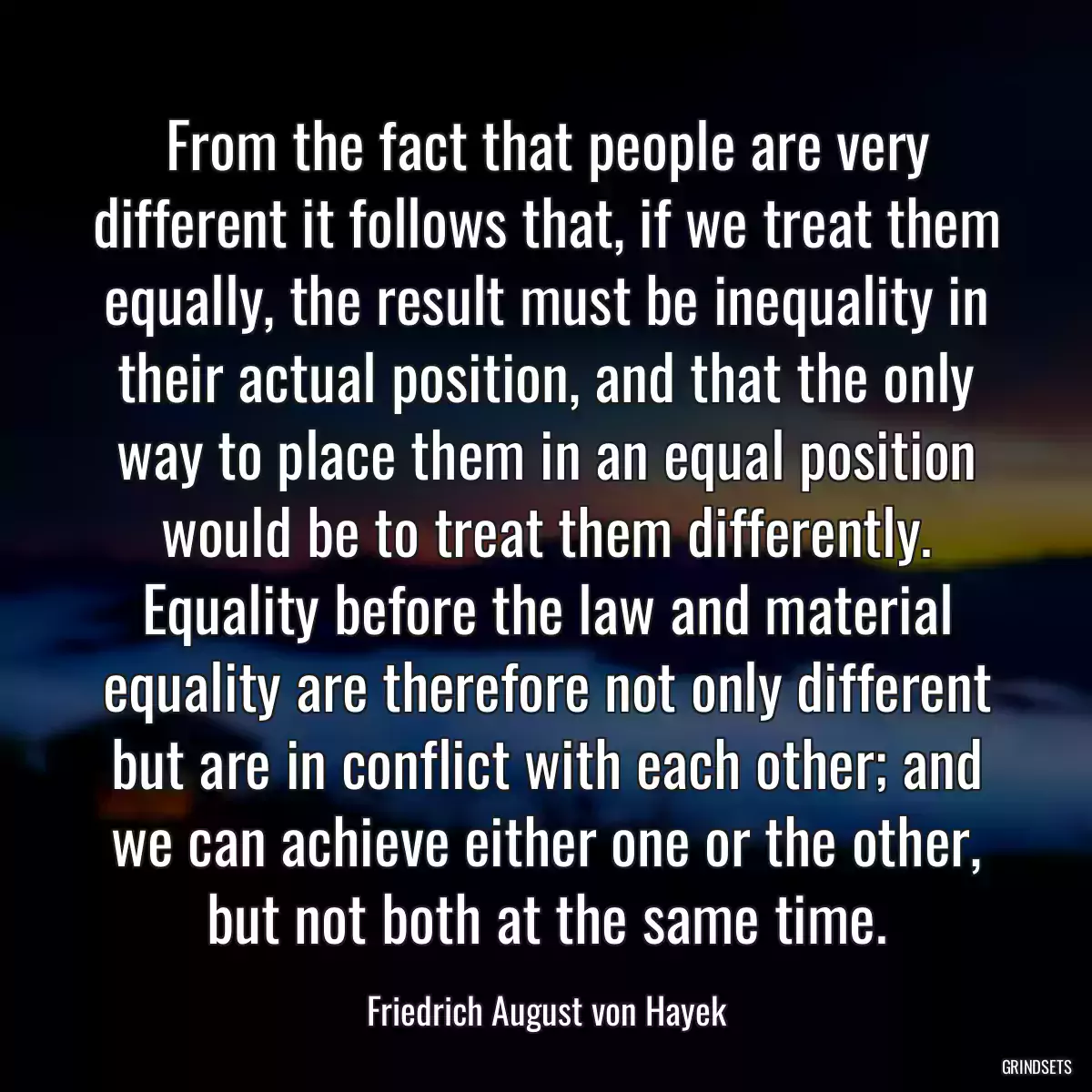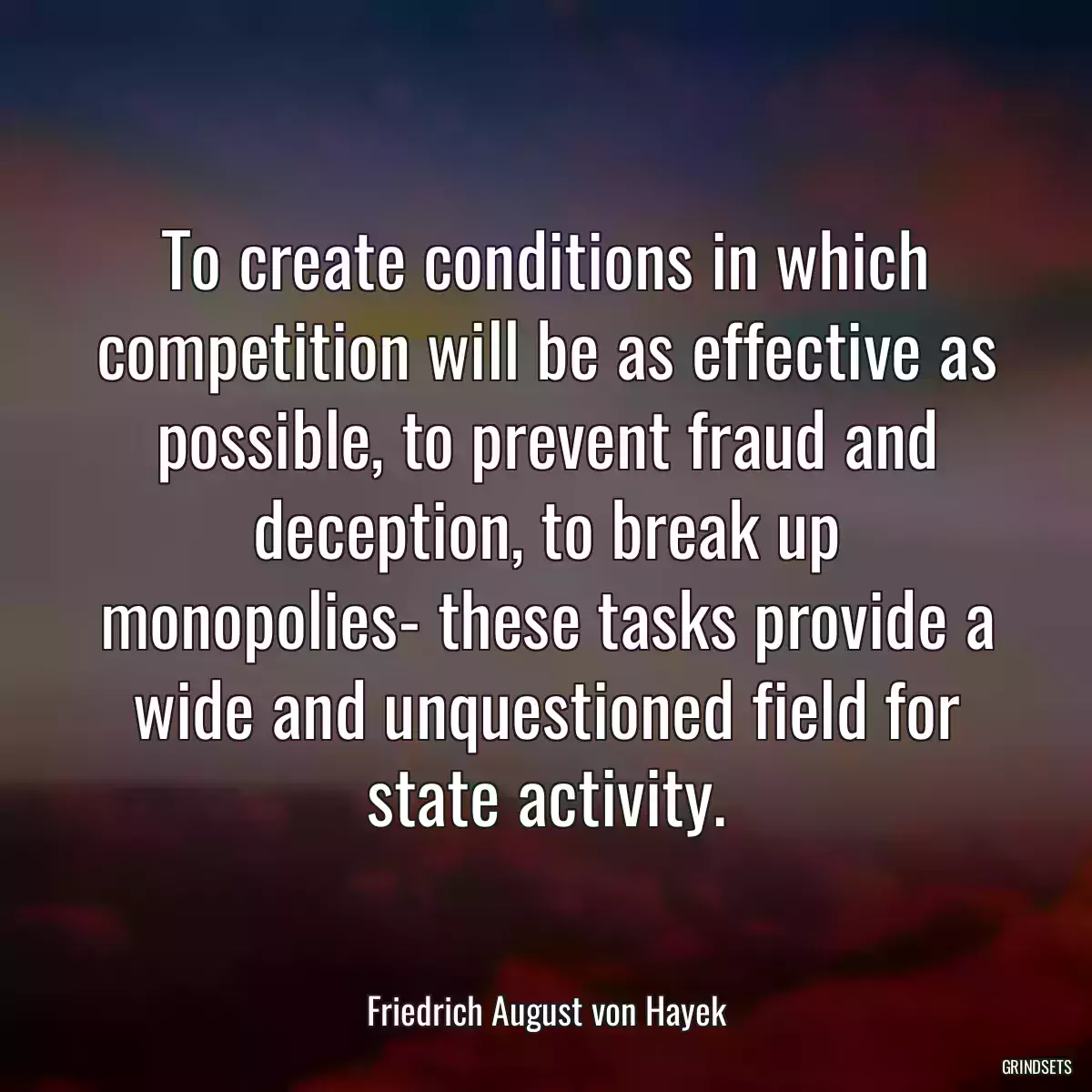
Quotes Friedrich August von Hayek - page 2
Find dozens of Friedrich August von Hayek with images to copy and share.

If we can reduce the risk of friction likely to lead to war, this is probably all we can reasonably hope to achieve.
If I am not mistaken, psychology, psychiatry and some branches of sociology, not to speak about the so-called philosophy of history, are even more affected by what I have called the scientistic prejudice, and by specious claims of what science can achieve.
There exists no third principle for the organisation of the economics process which can be rationally chosen to achieve any desirable ends, in addition to either a functioning market in which nobody can conclusively determine how well-off particular groups or individuals will be, or a central direction where a group organised for power determines it.
You may also like
In abbreviated form, by a kind of symbol, only the most essential information is passed on and passed on only to those concerned. It is more than a metaphor to describe the price system as a kind of machinery for registering change, or a system of telecommunications which enables individual producers to watch merely the movement of a few pointers, as an engineer might watch the hands of a few dials, in order to adjust their activities to changes of which they may never know more than is reflected in the price movement.
At a time when most movements that are thought to be progressive advocate further encroachments on individual liberty, those who cherish freedom are likely to expend their energies in opposition. In this they find themselves much of the time on the same side as those who habitually resist change.
I use throughout the term 'liberal' in the original, nineteenth-century sense in which it is still current in Britain. In current American usage it often means very nearly the opposite of this. It has been part of the camouflage of leftish movements in this country, helped by muddleheadedness of many who really believe in liberty, that 'liberal' has come to mean the advocacy of almost every kind of government control.
He will therefore have to use what knowledge he can achieve, not to shape the results as the craftsman shapes his handiwork, but rather to cultivate a growth by providing the appropriate environment, in the manner in which the gardener does this for his plants.
This means that to entrust to science - or to deliberate control according to scientific principles - more than scientific method can achieve may have deplorable effects.

From the fact that people are very different it follows that, if we treat them equally, the result must be inequality in their actual position, and that the only way to place them in an equal position would be to treat them differently. Equality before the law and material equality are therefore not only different but are in conflict with each other; and we can achieve either one or the other, but not both at the same time.
Civilization enables us constantly to profit from knowledge which we individually do not possess and because each individual's use of his particular knowledge may serve to assist others unknown to him in achieving their ends that men as members of civilized society can pursue their individual ends so much more successfully than they could alone.
It is one of the saddest spectacles of our time to see a great democratic movement support a policy which must lead to the destruction of democracy and which meanwhile can benefit only a minority of the masses who support it. Yet it is this support from the Left of the tendencies toward monopoly which make them so irresistible and the prospects of the future so dark.
The chief difference [between totalitarian and free countries] is that only the totalitarians appear clearly to know how they want to achieve that result, while the free world has only its past achievements to show, being by its very nature unable to offer any detailed "plan" for further growth.
Socialism has never and nowhere been at first a working-class movement. It is by no means an obvious remedy for the obvious evil which the interests of that class will necessarily demand. It is a construction of theorists.
A general flat minimum-wage law for all industry is permissible, but I do not think that it is a particularly wise method of achieving the end. I know much better methods of providing a minimum for everybody. But once you turn from laying down a general minimum for all industry to decreeing particular and different minimum for different industries, then, of course, you make the price mechanism inoperative, because it is no longer the price mechanism which will guide people between industries and trades.
...the case for individual freedom rests largely on the recognition of the inevitable and universal ignorance of all of us concerning a great many of the factors on which the achievements of our ends and welfare depend.
Human envy is certainly not one of the sources of discontent that a free society can eliminate. It is probably one of the essential conditions for the preservation of such a society that we do not countenance envy, not sanction its demands by camouflaging it as social justice, but treat it, in the words of John Stuart Mill, as 'the most anti-social and evil of all passions.'
The history of government management of money has, except for a few short happy periods, been one of incessant fraud and deception.
You may also like

Should our moral beliefs really prove to be dependent on factual assumptions shown to be incorrect, it would be hardly moral to defend them by refusing to acknowledge the facts.